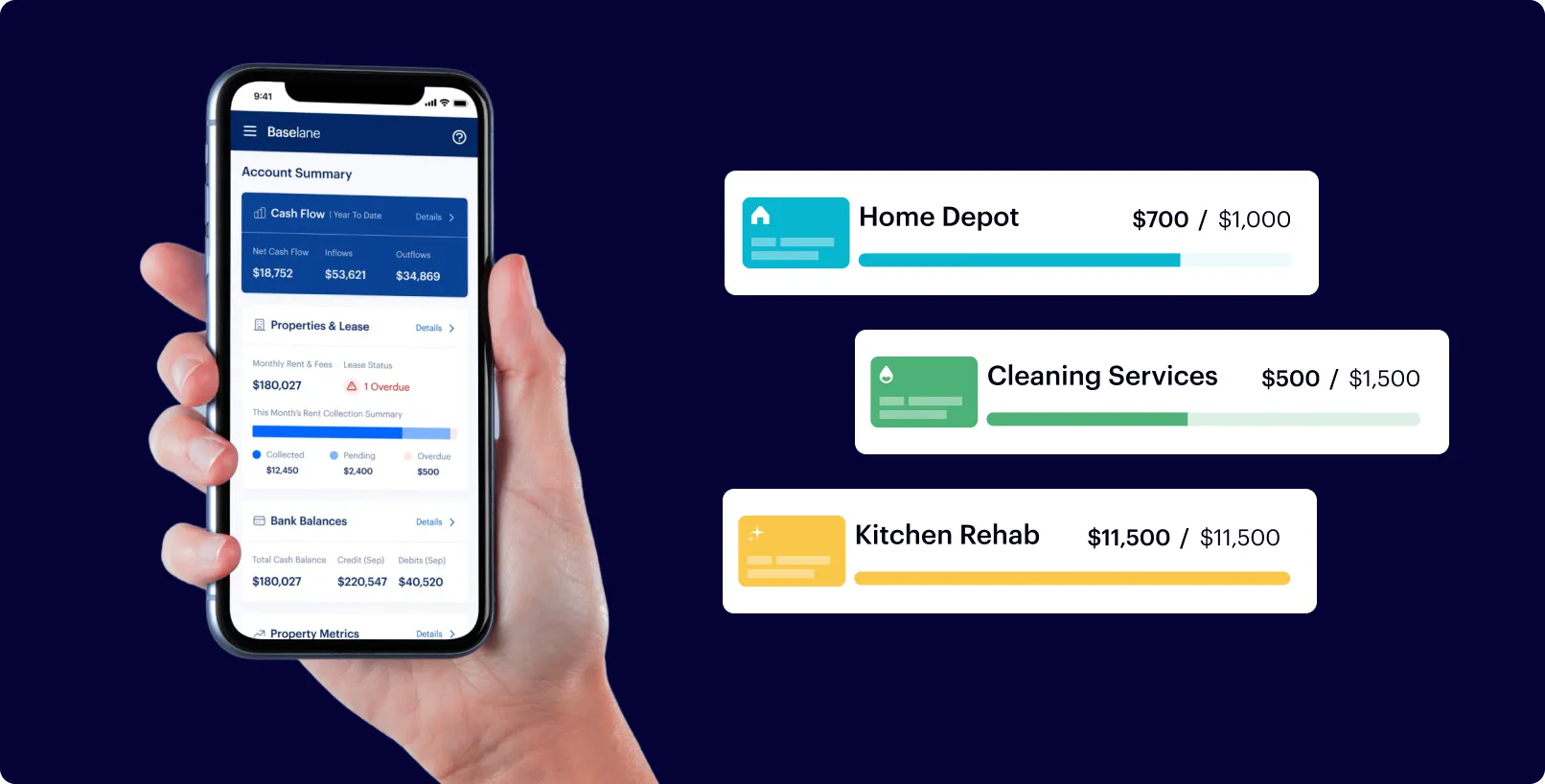Managing finances for rental properties can become complex, especially as your portfolio grows. Keeping personal and business finances separate is fundamental.
Establishing a clear banking structure provides essential organization, legal protection, and tax benefits for your real estate investments. Organizing your bank account strategy is a critical step for any serious investor.
Key takeaways
- Separate bank accounts prevent commingling funds, protecting personal assets from business liabilities.
- Specific legal structures, like LLCs, often require dedicated bank accounts to maintain liability protection.
- Using multiple accounts simplifies tracking income and expenses per property or entity for easier tax preparation.
- Common structures include one account per property or one account per legal entity, depending on portfolio size and structure.
- Selecting a banking partner with features like easy transfers, online access, and integrations is crucial for managing multiple accounts efficiently.
Why multiple bank accounts are essential for real estate investing
Preventing commingling is a primary reason real estate investors need separate bank accounts. Commingling occurs when personal and business funds are mixed together. This practice can blur the lines between personal and business finances, creating significant risk.
Protecting personal assets is directly tied to preventing commingling. For investors using legal structures like LLCs, maintaining distinct accounts is crucial. This separation helps ensure that personal assets are shielded from liabilities related to the rental business.
Using dedicated business accounts also presents a more professional image to tenants, lenders, and partners. It demonstrates that you treat your real estate activities as a legitimate business. This professionalism can build trust and simplify interactions with others involved in your investments.
Finally, separate accounts significantly simplify income and expense tracking. You can easily see which funds belong to the business and track cash flow specifically for your properties. This clarity is invaluable for financial analysis and decision-making.
Legal and tax implications of a single bank account
Maintaining the corporate veil is a key legal requirement for real estate held within LLCs. The "corporate veil" is the legal separation between the business entity and the owner. Failure to keep business finances separate, often through commingling, can lead courts to disregard this protection, potentially exposing personal assets to business debts or lawsuits.
State requirements also impact how you handle certain funds, particularly security deposits. Some jurisdictions mandate that security deposits be held in separate trust accounts. You must comply with these specific laws to avoid legal penalties.
Streamlining tax preparation is a major tax benefit of using separate accounts. Clear records of income and expenses per property or entity make completing Schedule E and other tax forms much simpler. This organization can potentially reduce tax preparation fees and help ensure you capture all eligible deductions.
Maintaining organized financial records through separate accounts can also reduce your audit risk. When your business finances are clearly delineated and well-documented, responding to inquiries from tax authorities becomes much easier. This reduces the likelihood of facing complications during an audit.
How the business structure impacts your banking needs
Your business structure significantly dictates your banking requirements. A sole proprietorship or partnership structure involves fewer legal formalities but offers less personal asset protection. In these structures, maintaining clear financial separation through dedicated accounts is still vital, although the legal mandate may be less stringent than with corporations.
Using LLC structures is common among real estate investors for liability protection. You might use one LLC for all properties or set up one LLC per property. Each structure has implications for banking.
Why dedicated accounts are crucial for LLCs cannot be overstated. If you hold properties within separate LLCs, each LLC must have its own bank account. This is necessary to maintain the legal separation required to uphold the limited liability protection. Establishing a limited liability company bank account is a fundamental step when using this structure.
Deciding on the best business structure for multiple rental properties impacts how many accounts you'll need and how they interact. Whether you use one LLC for everything or multiple LLCs, your banking setup must mirror your legal structure to ensure compliance and protection.
Common Banking Structures for Multiple Properties
Real estate investors use different banking structures depending on portfolio size, legal setup, and management needs. Below are the most common options:
One Account for All Properties
This is the simplest setup. All rental income and expenses flow through a single bank account. It’s suitable for landlords with one or two properties and no legal entities involved. However, it offers limited clarity, poor financial tracking, and minimal asset protection.
One Account per Property
In this model, each property has its own dedicated checking account. This allows for precise income and expense tracking at the property level. It’s ideal for small to mid-sized portfolios but can become time-consuming as the number of properties grows.
One Account per LLC
If you hold each property in a separate LLC, then each LLC should have its own bank account. This setup maintains legal separation between entities, which is key for liability protection. It adds administrative complexity but is essential for compliance and asset shielding.
Holding Company with Subsidiary LLCs
This advanced structure involves a parent holding company that owns multiple LLCs. Each subsidiary may have its own bank account. This setup supports large or institutional portfolios and offers strategic flexibility, but it requires expert-level financial oversight and often, professional accounting support.
How to set up multiple real estate bank accounts
The right bank account setup helps you stay organized, separate finances, and protect your investments. Here's how to set it up.
Step 1: Determine if You Need an EIN
Start by identifying whether you need an Employer Identification Number (EIN). If you're operating as a sole proprietor without employees, you may not need one. However, if you've formed an LLC, partnership, or corporation, you'll typically need an EIN from the IRS to open a business bank account.
Step 2: Choose the Right Account Types
Most landlords need a primary checking account for daily operations like rent collection and expense payments. A separate savings account is helpful for holding reserves for future repairs or capital expenditures. Depending on local laws, you may also need a dedicated escrow or trust account for tenant security deposits.
Step 3: Match Account Types to Property Use
The account type should align with your investment model. For short-term rentals, an Airbnb bank account should support frequent transactions and payouts. If you operate as a sole proprietor, open a sole proprietor bank account to keep business finances separate. Understanding the difference between business vs. personal checking accounts is critical for tax clarity and legal protection.
Step 4: Create Financial Separation by Property or Function
Even vacation rentals should have their own accounts. A business bank account for vacation rental homes helps isolate cash flow per unit. Landlords managing homeowners associations (HOAs) may need HOA-specific bank accounts with features tailored to community finances.
For LLCs, seek out free business bank accounts for LLCs to reduce costs while maintaining separation.
Step 5: Choose a Real Estate-Friendly Bank
Choosing the right bank involves more than just low fees. Look for banks or platforms that specialize in real estate—those that offer features like rent collection integration, automatic expense tagging, and multi-account management. These tools simplify bookkeeping and compliance.
Baselane offers banking solutions built specifically for real estate investors, allowing you to create unlimited accounts for different properties or purposes. These accounts automatically tag income and expenses by property, streamlining bookkeeping across multiple units or entities. FDIC insurance available up to [v="fdic_short"]¹ for funds deposited through Thread Bank; Member FDIC. Certain conditions must be satisfied for pass-through deposit insurance coverage to apply.
Best practices for managing multiple rental property accounts
Strict separation of funds is the golden rule. Never use a property's operating account for personal expenses or vice versa. All rental income should go into the designated business account, and all property-related expenses should be paid from it.
Consistent reconciliation is vital for maintaining accurate records. Regularly compare your bank statements to your bookkeeping records. This practice helps catch errors, track cash flow precisely, and ensures that your books are always up to date.
Utilizing sub-accounts or tags can provide granularity even within a single account structure. Some banking platforms or accounting software allow you to tag transactions by property or category. This provides detailed reporting without needing a physically separate bank account for every single unit if your structure doesn't require it. Baselane accounts feature automatic property and category tagging for expenses and income.
Setting aside funds for reserves is crucial for long-term property management. A separate savings account is ideal for building a capital expenditures (CapEx) fund to cover large repairs or vacancies. Consistent contributions ensure you have the funds needed when unexpected costs arise.
Handling security deposits correctly requires understanding state laws. Whether they need to be in a separate interest-bearing or non-interest-bearing account, ensure you comply with legal requirements. Do not use security deposit funds for operating expenses.
Automating transactions and rent collection saves significant time and reduces errors. Use online banking features to schedule recurring payments for mortgages or bills. Implement an online rent collection system where tenants pay directly into the designated property or operating account. Baselane provides automated rent collection features, sending invoices and reminders, and directing payments into your chosen account.
Choosing the right banking partner
Selecting a banking partner involves looking for features that support efficient real estate finance management. Online access is essential for managing accounts remotely and reviewing transactions anytime. Low fees are crucial to maximize your investment returns; look for options to avoid bank maintenance fees and other charges.
Integration capabilities are increasingly important. Look for banks or platforms that integrate with popular accounting software or rental property management tools. This allows for seamless data flow, automating bookkeeping and reporting.
Scalability is another key factor. As your portfolio grows, your banking needs may change. Choose a partner that can accommodate additional accounts easily and offers services that support larger operations.
Specialized accounts are also a consideration. Ask yourself:
- Does the bank offer dedicated accounts for security deposits if required by your state?
- Are there features tailored to real estate transactions, such as easy tracking of rental income and expenses?
Baselane offers banking solutions with features built specifically for real estate investors, including unlimited accounts with automated transaction tagging by property and Schedule E category.
Common mistakes to avoid while having multiple bank accounts
One of the most significant mistakes is commingling personal and business funds. This undermines legal protections, complicates accounting, and makes financial analysis nearly impossible. Always maintain a strict separation between your personal finances and your real estate business finances.
Poor record-keeping is another common pitfall. Without clear documentation tied to specific accounts, tracking profitability, preparing taxes, and justifying expenses becomes a nightmare. Ensure every transaction is categorized correctly and associated with the appropriate property or entity. Unlike traditional banking, Baselane integrates banking features with built-in bookkeeping features, with AI-powered auto-categorization and tagging.
Ignoring security deposit laws can lead to legal trouble. Failing to hold deposits in the required type of account or using them improperly can result in penalties. Always follow your state and local regulations regarding tenant security deposits.
Choosing the wrong bank or platform can hinder your efficiency. A traditional bank not set up for multiple property tracking or online-only access may create an unnecessary administrative burden. Look for financial tools designed for real estate investors.
Finally, failing to adapt your banking structure as your portfolio grows is a mistake. What worked for one property may not be suitable for ten properties held in multiple LLCs. Periodically review your legal structure and banking setup to ensure they align with your current operations and growth plans.
Conclusion
Structuring multiple bank accounts is not just a best practice for real estate investors; it's often a necessity for legal protection, tax compliance, and efficient management.
By preventing commingling and establishing dedicated accounts per property or legal entity, you protect personal assets, streamline accounting, and gain a clearer view of your portfolio's performance.
Choosing a banking solution like Baselane, designed with real estate investors in mind, can simplify the management of multiple accounts, automate bookkeeping, and help you focus on growing your investments. Take control of your real estate finances by implementing a smart banking structure today.
FAQs
Why do real estate investors need multiple bank accounts?
Real estate investors need multiple bank accounts to separate personal and business funds, protect personal assets (especially with LLCs), comply with state laws for funds like security deposits, and simplify tracking income and expenses per property for easier bookkeeping and tax preparation.
How many bank accounts should a landlord have?
The number of accounts depends on portfolio size and business structure. A basic setup often includes an operating account, a security deposit account, and a reserve fund account. Investors with multiple properties or using separate LLCs per property will need additional dedicated accounts for each entity.
Is a separate bank account required for each rental property?
A separate bank account is legally required for each rental property if each property is held in a separate legal entity, such as its own LLC. Even without this legal requirement, having a separate account per property can significantly improve financial clarity and tracking.
What is commingling of funds in real estate?
Commingling is the illegal or unethical practice of mixing personal funds with funds belonging to clients or others, such as tenant security deposits, or mixing personal funds with business funds, such as rental income or expense money. This can jeopardize legal protections like the corporate veil.













.jpg)

.jpg)

